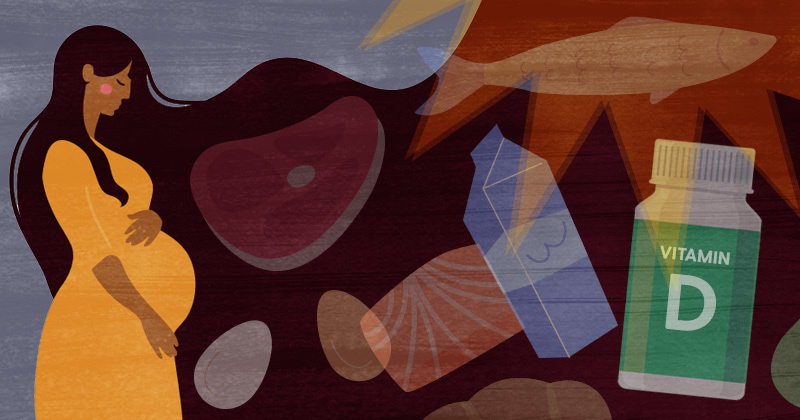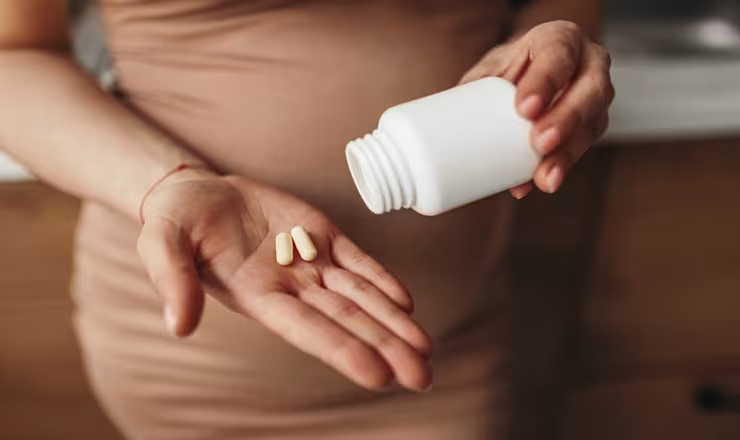
Vitamin D, often called the “sunshine vitamin,” plays an essential role in supporting a healthy pregnancy. Beyond its well-known contribution to bone health, this powerful nutrient offers a range of protective and developmental advantages for both mother and baby. From reducing the risk of gestational diabetes to supporting the development of the baby’s skeletal system, pregnancy vitamin D benefits are numerous—and too important to ignore.
Yet despite its importance, vitamin D deficiency remains alarmingly common among pregnant women worldwide. In this article, we’ll explore why vitamin D matters during pregnancy, how to get enough of it, what the latest research reveals, and how expecting mothers can take proactive steps to protect themselves and their growing babies.
Why Vitamin D Is Crucial During Pregnancy
Vitamin D is a fat-soluble vitamin that plays a central role in calcium and phosphorus absorption. It contributes to bone formation, immune regulation, neuromuscular function, and cellular processes. During pregnancy, its role expands even further, influencing everything from fetal bone development to placental function.
Deficiency in this vitamin during pregnancy has been associated with complications such as preeclampsia, low birth weight, impaired fetal growth, and a higher risk of cesarean delivery. In fact, studies show that mothers with sufficient vitamin D levels are more likely to experience full-term deliveries and have babies with healthy birth weights and stronger immune defenses.
The body produces vitamin D when the skin is exposed to sunlight, but modern lifestyles, geographic location, skin tone, and dietary choices can significantly reduce this natural production—making supplementation and diet especially important during pregnancy.
Top Pregnancy Vitamin D Benefits You Should Know
Let’s take a closer look at some of the most widely recognized benefits of vitamin D during pregnancy:
1. Supports Fetal Skeletal and Dental Development
The fetus relies entirely on the mother’s vitamin D supply for developing strong bones and teeth. This nutrient is critical in aiding calcium absorption in the intestines, which is essential for the mineralization of fetal bones. Without enough vitamin D, babies may be born with lower bone density or be at greater risk for conditions such as congenital rickets or delayed tooth eruption.
2. Reduces Risk of Preeclampsia
Preeclampsia is a potentially life-threatening pregnancy complication characterized by high blood pressure and damage to other organs, most commonly the liver and kidneys. Research from the American College of Obstetricians and Gynecologists indicates that low levels of vitamin D may impair placental development and function, increasing the risk of preeclampsia. Ensuring sufficient vitamin D intake can offer a simple, preventative approach.
3. May Lower Risk of Gestational Diabetes
Gestational diabetes occurs when blood sugar levels become elevated during pregnancy, which can result in complications such as excessive birth weight, preterm birth, and the need for a cesarean section. Some studies have linked higher vitamin D levels with improved insulin sensitivity and better glucose metabolism. While more research is needed, supplementing vitamin D is considered a low-risk strategy with potentially high rewards.
4. Improves Birth Outcomes
Mothers with adequate vitamin D levels are more likely to have full-term pregnancies and healthier babies. Low birth weight and preterm delivery have been associated with vitamin D deficiency. An observational study published by the NIH showed a 60% increased risk of premature birth among vitamin D-deficient women.
5. Boosts Maternal Immune Function
Pregnancy temporarily suppresses parts of the immune system to accommodate the growing fetus. Vitamin D helps modulate immune responses and reduces inflammation. This can reduce the mother’s risk of infections during pregnancy and support faster recovery in the postpartum period.
6. Protects Against Mood Disorders
Vitamin D receptors are present in the brain, and deficiency has been linked to mood disorders such as prenatal depression and postpartum anxiety. While depression is multifactorial, ensuring adequate vitamin D can be one piece of a larger mental health support plan during and after pregnancy.
Why Deficiency Is Widespread Among Expecting Mothers
Vitamin D deficiency is particularly common among pregnant women, with estimates ranging from 20% to 60% depending on region, ethnicity, and lifestyle. Several factors contribute:
-
Limited Sunlight Exposure: Urban lifestyles, long indoor work hours, air pollution, and sunscreen use all reduce vitamin D synthesis in the skin.
-
High Melanin Content: Darker-skinned individuals require longer sun exposure to produce the same amount of vitamin D as those with lighter skin.
-
Poor Dietary Intake: Only a handful of foods—like salmon, sardines, liver, and fortified milk—contain meaningful levels of vitamin D.
-
Obesity: Vitamin D is fat-soluble and can become sequestered in body fat, reducing its bioavailability in circulation.
Healthcare professionals recommend regular monitoring and individualized supplementation, especially for high-risk populations.
How Much Vitamin D Should Pregnant Women Take?
The current recommendation from the Institute of Medicine is 600 IU (15 mcg) of vitamin D daily for pregnant women. However, growing evidence suggests that this may be too low for achieving optimal serum 25(OH)D levels, especially for women who live in northern climates or spend little time outdoors.
Some researchers advocate for 1,000 to 4,000 IU per day, depending on the individual’s baseline levels. In one randomized trial, women who took 4,000 IU of vitamin D daily had the lowest rates of preterm birth and the highest levels of circulating vitamin D—without any adverse effects.
The American Pregnancy Association supports tailored supplementation, especially for those at high risk of deficiency. As always, consult a qualified healthcare provider before beginning or adjusting supplementation.
Read more from the Mayo Clinic on prenatal nutrition
Getting Vitamin D from Food and Sunlight
While sun exposure is the most natural source of vitamin D, dietary intake is especially important during pregnancy when supplement needs rise. The following foods are rich in vitamin D and safe for expectant mothers:
-
Fatty Fish: Salmon, mackerel, and trout are high in vitamin D and omega-3s.
-
Egg Yolks: Especially from pasture-raised chickens.
-
Fortified Foods: Many dairy products, plant-based milks, cereals, and orange juice are fortified.
-
Mushrooms: Especially those exposed to UV light (check labeling).
Visit the NIH Dietary Supplement Office for a full list of vitamin D food sources.
Safe sun exposure guidelines recommend 10–30 minutes of midday sun on arms and legs, two to three times per week. However, these vary based on skin tone, geographic location, season, and cloud cover.
Signs and Symptoms of Vitamin D Deficiency
Because symptoms of low vitamin D can be subtle or mistaken for normal pregnancy discomforts, deficiency often goes undetected. Common symptoms include:
-
Persistent fatigue
-
Bone or back pain
-
Low mood or irritability
-
Frequent colds or infections
-
Muscle cramps or weakness
If these persist, speak with your provider about blood testing for vitamin D levels. Optimal serum levels are generally considered to be above 30 ng/mL.
Pregnancy Vitamin D Benefits for the Baby
Your baby’s growth and development depend heavily on your nutrient reserves. Here’s how vitamin D specifically supports fetal health:
-
Skeletal Formation: Ensures proper bone mineralization and growth.
-
Neurological Development: May support brain and nervous system development.
-
Immune Maturation: May influence fetal immune function, reducing the risk of childhood allergies or autoimmune conditions.
Emerging research even links adequate maternal vitamin D with improved language skills and IQ scores in children, although more studies are needed to confirm these effects.
Addressing Common Myths About Vitamin D and Pregnancy
“You can get all the vitamin D you need from the sun.”
Not always true. Many pregnant women work indoors, wear sunscreen, or live in regions with limited sun exposure—especially in winter months.
“Vitamin D is dangerous in high doses.”
Extremely high doses (above 10,000 IU daily) can be harmful, but moderate doses of up to 4,000 IU are considered safe during pregnancy when monitored.
“If you take a prenatal vitamin, you’re covered.”
Most prenatal vitamins contain only 400–600 IU of vitamin D—often below the therapeutic level. Blood tests can help determine whether additional supplementation is needed.
Frequently Asked Questions (FAQ)
Q: When should I start taking vitamin D during pregnancy?
A: Ideally, vitamin D supplementation should begin before conception or in the first trimester. Early levels influence early fetal development, especially bone formation.
Q: Can I combine vitamin D with other supplements like calcium or magnesium?
A: Yes. Vitamin D works synergistically with calcium and magnesium. Many prenatal vitamins already combine these. Just ensure total intake stays within safe limits.
Q: How do I know if I’m getting enough vitamin D?
A: A blood test measuring 25(OH)D levels is the most reliable indicator. Levels above 30 ng/mL are generally sufficient; some experts prefer levels closer to 40–60 ng/mL during pregnancy.
Q: What if I’m vegan or lactose intolerant?
A: Choose fortified plant-based milks and cereals, UV-exposed mushrooms, and vitamin D3 supplements derived from lichen (a vegan source).
Q: Can vitamin D reduce my risk of needing a C-section?
A: Some research suggests that low vitamin D levels are associated with increased rates of cesarean delivery, possibly due to poor muscle strength or complications like preeclampsia.
Q: Do I need more vitamin D if I’m having twins?
A: You may require higher levels to support multiple babies. Always consult your obstetrician or midwife to tailor supplementation.
Final Thoughts: Let the Sunshine In
Vitamin D may be invisible, but its effects on pregnancy are anything but. From protecting mothers against complications to giving babies a stronger, healthier start, pregnancy vitamin D benefits are truly remarkable. With the right guidance and a proactive mindset, expecting mothers can ensure they’re doing everything possible to support a vibrant, healthy pregnancy—for themselves and for the new life growing inside them.






